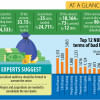State banks’ Tk 1,600cr stuck in ailing NBFIs

Deposits of Tk 1,600 crore of four state-run commercial banks —Sonali, Rupali, Agrani, and Janata — have been stuck in several weak non-bank financial institutions (NBFIs) as the latter have repeatedly failed to repay despite maturity owing to a persisting liquidity crisis.
Of the sum, Tk 1,392 crore was kept as fixed deposits and the rest was extended as loans through the call money market, financial reports of the banks for 2022 showed.
The NBFIs are Bangladesh Industrial Finance Company (BIFC), FAS Finance, First Finance, International Leasing & Financial Services Ltd (ILFSL), People's Leasing & Financial Services Limited, Premier Leasing, Prime Finance, Fareast Finance, and Union Capital.
The placement of deposits in the weak NBFIs raised the question of whether the banks carried out required due diligence before parking the depositors' funds.
Apart from this, the banks have kept about Tk 1,200 crore in some troubled banks as well.
The state lenders claim that the lucrative interest rate has been the main driver for the investment decision.
Analysts, however, are unconvinced, saying giving support through deposits has been done either on the basis of wrong analysis or to receive unethical benefits.
Although ICB Islamic Bank, the only bank that has been incurring losses for at least one decade, and Padma Bank, which has been renamed from Farmers Bank in order to sweep gross irregularities and loan scams under the rug, has been struggling for several years, it was able to attract deposits from the four banks.
"I don't know why the banks have kept their funds in such banks or NBFIs. There might be political pressure," said AB Mirza Azizul Islam, a former finance adviser to the caretaker government.
"The banks should keep their funds in banks or NBFIs after analysing their situation meticulously."
Agrani Bank kept Tk 409 crore in the form of fixed-deposit receipts (FDRs) with BIFC, FAS Finance, First Finance, ILFSL, People's Leasing, Premier Leasing, Prime Finance, Fareast Finance, and Union Capital.
It opened FDRs worth Tk 200 crore at Padma Bank and Tk 6.9 crore at ICB Islamic Bank and lent Tk 51 crore to FAS Finance, Prime Finance, BIFC, First Finance, People's Leasing and Premier Leasing through the call money market.
It invested Tk 100 crore in the subordinated bond of Padma Bank.
The bank is intensely pursuing but the NBFIs are unable to repay the FDR amount on maturity, said Agrani Bank in its financial report.
Zaid Bakht, chairman of Agrani Bank, said most of the FDRs at banks are okay. However, FDRs with some NBFIs have been stuck as they fell into problems recently.
The investment in Padma Bank was made under a special situation and all the state-run banks had to invest following a government decision, he said.
The state-run banks are getting interest from their investments in the subordinated bonds of banks and NBFIs regularly. The redemption of the bonds is also regular.
The former research director of the Bangladesh Institute of Development Studies said the NBFIs had been doing well before descending into the current problematic state.
"Many general people are also in trouble for their investments in the NBFIs, whose bad image has impacted the entire sector. As a result, some good NBFIs have fallen into crisis. Many banks' FDRs have become stuck in the NBFIs."
Last year, 14 out of 35 NBFIs in Bangladesh were in the red zone in a stress test carried out by the central bank, up from 12 in 2021.
In June, the NBFI sector's defaulted loans rose to Tk 19,951 crore, accounting for a staggering 27.65 percent of the total outstanding credits, central bank figures showed.
A former top official of a state-run bank said the government-owned banks normally do not want to invest or keep funds in any ailing firms. Sometimes, they did so because of the directors' influence or political pressure.
"Sometimes, top officials get involved in the decision of keeping funds with weak funds in exchange for benefits. So, a rigorous investigation is necessary and accountability needs to be ensured."
He said the NBFIs had used the deposits to lend to borrowers. So, the NBFIs could transfer the loans to the banks, paving the way for the latter to recoup the funds on their own.
At the heart of the NBFI sector's woes are large-scale irregularities.
A central bank inspection in 2020 unearthed huge irregularities and scams at a dozen NBFIs, including People's Leasing, ILFSL, Premier Leasing, Uttara Finance, and First Finance.
Rupali Bank invested Tk 566 crore through the opening of FDRs with some NBFIs and opened FDRs involving Tk 110 crore with Padma Bank and Tk 19.89 crore with ICB Islamic Bank.
"When Rupali Bank kept the fund with the NBFIs, the business of the NBFIs was in good condition, their capital was strong and the classified loan was low. It was tough to predict at the time that they would fall to any difficult situation," said Md Harunur Rashid, chief financial officer of Rupali Bank.
"It was unexpected. Now, we are keeping regular communication with the NBFIs."
He said the NBFIs can talk to the central bank to find a solution.
Sonali Bank invested Tk 240 crore in Padma Bank, Tk 14.5 crore in ICB Islamic Bank and Tk 164 crore with several non-banks.
Janata Bank's investment in the form of fixed deposits was Tk 190 crore at Padma Bank, Tk 14 crore at ICB Islamic Bank, and Tk 253 crore with several NBFIs.
Md Abdul Jabber, managing director of Janata Bank, and Md Afzal Karim, managing director of Sonali Bank, could not be contacted for comments despite repeated attempts.
Hasina Jannat, head of treasury at First Finance, said the company can't repay the funds due mainly to a liquidity crisis.
"We are giving priority to individual depositors. We plan to return the funds to the state-run banks if a major loan recovery can be done."
A non-listed firm owes a large amount to First Finance and the NBFI is trying to recover it, he said.
Md Mashiur Rahman, acting managing director of ILFSL, said it has liabilities of around Tk 2,000 crore with several banks and around Tk 2,000 crore with other NBFIs and corporate firms.
"Due to the liquidity crisis, we are currently not in a position to repay the funds."
He said the company is restructuring the equity base and hopes to reach a solution in the upcoming months.
Md Delowar, a treasury official of ICB Islamic Bank, said most of the FDRs of the state-run banks were opened when it was running its operations under the name of Oriental Bank.
When it was renamed to ICB Islamic Bank in 2008, the bank's liability was more than Tk 2,400 crore. It now stands at Tk 400 crore.
"We are paying back our depositors gradually and the interest is also being provided," Delowar added.

 For all latest news, follow The Daily Star's Google News channel.
For all latest news, follow The Daily Star's Google News channel. 








Comments